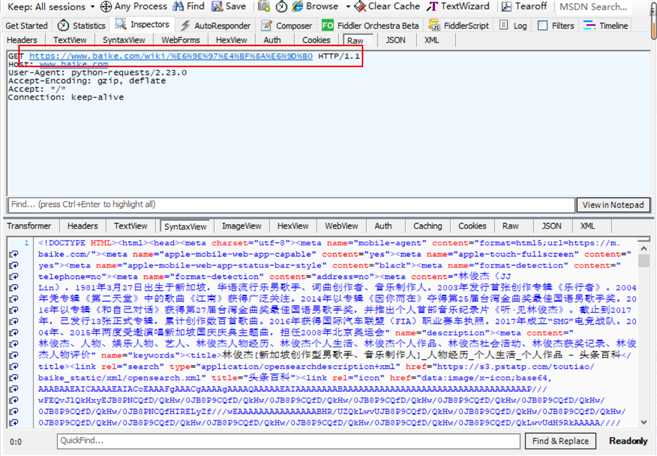requests模块爬取会对默认的url进行编码
2021-03-05 12:27
标签:support ons 编码 int 构建 host decode nat environ 如图,requests模块会对我们请求的url进行编码,那么他是在哪里做的呢?我们看下源码 首先是get方法 把我们的参数传给request了,我们看看request方法 原来是利用session进行了请求,我们在看看session.request方法 把请求参数构建res对象传给prepare_request方法了,那么我们看看prepare_request方法 把参数交给PreparedRequest类构建对象再传给在传给prepare方法 看下prepare方法 又调用了self.prepare_url(url, params)处理 对url进行了一系列处理之r后又调用requote_uri方法 最终都是进行编码了。 这里主要是想说: 1.在url中传入中文是没问题,只要url值正常的url,有对应的页面,都可以借助requests进行请求,request模块自动的帮你编码 2.如果你不想那个url被编码,要么你用白哦准模块 requests模块爬取会对默认的url进行编码 标签:support ons 编码 int 构建 host decode nat environ 原文地址:https://www.cnblogs.com/tjp40922/p/12907833.html一.当使用request模块请求的时候,requests首先会对url进行编码,可以通过抓包软件查看
import requests
res = requests.get(‘https://www.baike.com/wiki/林俊杰‘,verify=False)
print(res)
print(res.url)

def get(url, params=None, **kwargs):
r"""Sends a GET request.
:param url: URL for the new :class:`Request` object.
:param params: (optional) Dictionary, list of tuples or bytes to send
in the query string for the :class:`Request`.
:param \*\*kwargs: Optional arguments that ``request`` takes.
:return: :class:`Response
def request(method, url, **kwargs):
with sessions.Session() as session:
return session.request(method=method, url=url, **kwargs)
def request(self, method, url,
req = Request(
method=method.upper(),
url=url,
headers=headers,
files=files,
data=data or {},
json=json,
params=params or {},
auth=auth,
cookies=cookies,
hooks=hooks,
)
prep = self.prepare_request(req)
proxies = proxies or {}
settings = self.merge_environment_settings(
prep.url, proxies, stream, verify, cert
)
# Send the request.
send_kwargs = {
‘timeout‘: timeout,
‘allow_redirects‘: allow_redirects,
}
send_kwargs.update(settings)
resp = self.send(prep, **send_kwargs)
return resp
def prepare_request(self, request):
auth = request.auth
if self.trust_env and not auth and not self.auth:
auth = get_netrc_auth(request.url)
p = PreparedRequest()
p.prepare(
method=request.method.upper(),
url=request.url,
files=request.files,
data=request.data,
json=request.json,
headers=merge_setting(request.headers, self.headers, dict_class=CaseInsensitiveDict),
params=merge_setting(request.params, self.params),
auth=merge_setting(auth, self.auth),
cookies=merged_cookies,
hooks=merge_hooks(request.hooks, self.hooks),
)
return p
def prepare(self,
method=None, url=None, headers=None, files=None, data=None,
params=None, auth=None, cookies=None, hooks=None, json=None):
"""Prepares the entire request with the given parameters."""
self.prepare_method(method)
self.prepare_url(url, params)
self.prepare_headers(headers)
self.prepare_cookies(cookies)
self.prepare_body(data, files, json)
self.prepare_auth(auth, url)
self.prepare_hooks(hooks)
def prepare_url(self, url, params):
"""Prepares the given HTTP URL."""
if isinstance(url, bytes):
url = url.decode(‘utf8‘)
else:
url = unicode(url) if is_py2 else str(url)
# Remove leading whitespaces from url
url = url.lstrip()
# Don‘t do any URL preparation for non-HTTP schemes like `mailto`,
# `data` etc to work around exceptions from `url_parse`, which
# handles RFC 3986 only.
if ‘:‘ in url and not url.lower().startswith(‘http‘):
self.url = url
return
# Support for unicode domain names and paths.
try:
scheme, auth, host, port, path, query, fragment = parse_url(url)
except LocationParseError as e:
raise InvalidURL(*e.args)
if not scheme:
error = ("Invalid URL {0!r}: No schema supplied. Perhaps you meant http://{0}?")
error = error.format(to_native_string(url, ‘utf8‘))
raise MissingSchema(error)
if not host:
raise InvalidURL("Invalid URL %r: No host supplied" % url)
# In general, we want to try IDNA encoding the hostname if the string contains
# non-ASCII characters. This allows users to automatically get the correct IDNA
# behaviour. For strings containing only ASCII characters, we need to also verify
# it doesn‘t start with a wildcard (*), before allowing the unencoded hostname.
if not unicode_is_ascii(host):
try:
host = self._get_idna_encoded_host(host)
except UnicodeError:
raise InvalidURL(‘URL has an invalid label.‘)
elif host.startswith(u‘*‘):
raise InvalidURL(‘URL has an invalid label.‘)
# Carefully reconstruct the network location
netloc = auth or ‘‘
if netloc:
netloc += ‘@‘
netloc += host
if port:
netloc += ‘:‘ + str(port)
# Bare domains aren‘t valid URLs.
if not path:
path = ‘/‘
if is_py2:
if isinstance(scheme, str):
scheme = scheme.encode(‘utf-8‘)
if isinstance(netloc, str):
netloc = netloc.encode(‘utf-8‘)
if isinstance(path, str):
path = path.encode(‘utf-8‘)
if isinstance(query, str):
query = query.encode(‘utf-8‘)
if isinstance(fragment, str):
fragment = fragment.encode(‘utf-8‘)
if isinstance(params, (str, bytes)):
params = to_native_string(params)
enc_params = self._encode_params(params)
if enc_params:
if query:
query = ‘%s&%s‘ % (query, enc_params)
else:
query = enc_params
url = requote_uri(urlunparse([scheme, netloc, path, None, query, fragment]))
self.url = url
def requote_uri(uri):
"""Re-quote the given URI.
This function passes the given URI through an unquote/quote cycle to
ensure that it is fully and consistently quoted.
:rtype: str
"""
safe_with_percent = "!#$%&‘()*+,/:;=?@[]~"
safe_without_percent = "!#$&‘()*+,/:;=?@[]~"
try:
# Unquote only the unreserved characters
# Then quote only illegal characters (do not quote reserved,
# unreserved, or ‘%‘)
return quote(unquote_unreserved(uri), safe=safe_with_percent)
except InvalidURL:
# We couldn‘t unquote the given URI, so let‘s try quoting it, but
# there may be unquoted ‘%‘s in the URI. We need to make sure they‘re
# properly quoted so they do not cause issues elsewhere.
return quote(uri, safe=safe_without_percent)
二.简单修改源码使其不会被编码
with request.urlopen(url) as response:
data = response.read()
return data.decode(‘utf-8‘)
文章标题:requests模块爬取会对默认的url进行编码
文章链接:http://soscw.com/index.php/essay/60439.html